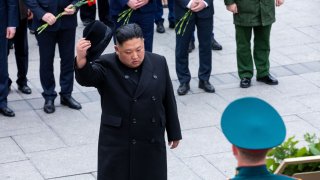The Russia-China-North Korea Trilateral Masks Hidden Differences
President Vladimir Putin’s recent visit to Pyongyang could create challenges in bilateral relations with Beijing.
On Tuesday, June 18, Putin made his first official trip to North Korea since 2000 for talks with his fellow autocrat Kim Jong Un. The visit is Putin’s fourth foreign trip since his “re-election” in March, following visits to Beijing, Minsk, and Tashkent in May.
Russia and North Korea have seen their cooperation increase significantly during the past year. Politically, several high-level meetings have taken place, as Putin and Kim met in Vladivostok in September, North Korea’s Foreign Minister visited Moscow in January 2024, and Russia’s then-Defense Minister Shoigu went to Pyongyang in July 2023. Recently, North Korean state media called Putin the “Korean people’s best friend.”
In the military cooperation sphere, North Korea has provided Russia with a large amount of ammunition to bolster Russia’s war efforts, dwarfing the EU’s ammunition provisions to Ukraine so far. In return, Moscow has supported Pyongyang economically, technologically, and diplomatically. Interestingly, Russia has made a quick turn in its stance on North Korea, from supporting sanctions against Pyongyang as late as 2017 to blocking the renewal of North Korea sanctions monitors in March 2024.
Many have argued that Russia’s growing ties with North Korea, together with China, Iran, and potentially others, signifies an emerging axis of “evil” or “upheaval.” These countries increasingly coordinate and cooperate strategically, economically, and militarily to counter and sabotage Western sanctions, global interests, and efforts to uphold the liberal world order and democracy worldwide.
Indeed, for China, improving ties between Russia and North Korea has beneficial consequences. Both Moscow and Pyongyang are globally isolated junior partners who serve vital functions for Beijing and who must be supported. Essentially, China wants to prop up both pariah states without risking economic and diplomatic relations with the West. If North Korea can provide Russia with ammunition, and Russia can support North Korea’s economic needs, then China gets what it wants without having to bear the responsibility or blame itself for the results in the eyes of the West.
However, an improvement in Moscow-Pyongyang relations might negatively impact Chinese interests and pose challenges to Moscow-Beijing alignment and relations.
First, this might be detrimental to China’s regional goals in Northeast Asia. Moscow’s support, especially if it extends into the military-technological and nuclear realm, might embolden Pyongyang into more aggressive behavior. An unstable Korean peninsula is not in Beijing’s interests, especially if it necessitates and hastens further U.S.-Japan-South Korea military cooperation and regional strategic alignment. One trio could thus strengthen another.
This might also further complicate China’s already tricky navigation through rivalry with the United States, as it constrains Beijing’s room for maneuver in the region.
Second, if the rest of the world, including the so-called “Global South,” increasingly comes to view China as part of a toxic trio with Russia and North Korea, this might be counterproductive to Beijing’s narrational efforts to strengthen its image as a responsible international actor and suitable replacement for the United States as global hegemon. It also runs counter to China’s standard criticism of U.S. “block thinking” and “Cold War mentality.” Moreover, this authoritarian club is likely a much less appetizing operationalization of “multipolarity” for China than organizations such as BRICS and SCO.
Third, relatedly, throughout Russia’s full-scale invasion of Ukraine, China has carefully balanced between supporting Russia’s economy and war efforts on the one hand and keeping up diplomatic and economic relations with the West on the other by not providing direct lethal aid to Russia. This might be made more difficult if China is increasingly associated with two nuclear saber-rattling rogue states.
Fourth, relatedly, potential Russian nuclear-technological support for North Korea might clash with China’s red lines. China has previously signaled against Russian nuclear rhetoric (although potentially mainly to satisfy Western audiences) and has complex relations with North Korea’s nuclear ambitions, having both supported sanctions against Pyongyang while providing extensive support to circumvent them. It is, therefore, unclear how China would react to clear evidence of Russian technological support for North Korea’s nuclear arms program.
Fifth, a discrepancy between Russia’s and China’s interests is that both want the other to serve as a distraction for the West, particularly the United States, in their respective theatres of geopolitical conflict, allowing them more freedom of maneuver in their own. Thus, if Russia’s ties with North Korea draw more Western and U.S. attention and resources to China’s proximity, this is good for Russia but bad for China.
Thus, taking all these aspects into consideration, Russia’s actions in building relations with North Korea, partly in misalignment with China’s interests and wishes, demonstrate that Moscow and Pyongyang increasingly are playing similar roles for China—useful but unstable and toxic anti-Western strategic partners that Beijing struggles to control but is forced to support.
Interestingly, Moscow might also use its ties with Pyongyang as leverage against China in an attempt to mitigate the growing inequality between the two and Moscow’s dependence on Beijing. Russia’s support for North Korea gives Moscow the potential ability to influence the stability of the Korean peninsula, making Beijing dependent on Moscow’s “goodwill.” It might also be a way for North Korea to play out the two powerful neighbors against each other.
While an isolated Putin is going to Pyongyang to ensure a continued steady stream of North Korean ammunitions and weapons, he might, in the process, be creating headaches and irritation for his closest and most important partner to the south.
Hugo von Essen is an analyst at the Stockholm Centre for Eastern European Studies (SCEEUS), where he leads the SCEEUS Eastern Europe Policy Project. He has published articles in various outlets, including International Studies Review, Foreign Policy, and Transatlantic Policy Quarterly. Follow him on X: @HugovonEssen.
Image: Alexander Khitrov / Shutterstock.com.

